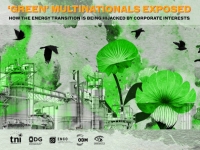'Green' Multinationals Exposed: How the Energy Transition is Being Hijacked by Corporate Interests

Private sector projects to solve the climate crisis have soared in the last decade: green energy options from British Gas and NextEra; Tesla electric cars; panels from JinkoSolar in China; and Siemens wind turbines in the North Sea. Yet how many truly mark a departure from business-as-usual by industry?
A new report – researched and written by CorpWatch in collaboration with the Transnational Institute, Multinationals Observatory, Debt Observatory in Globalisation and the European Network of Corporate Observatories - exposes energy companies' latest greenwashing tricks.
Here are the key conclusions:
* Most multinationals that promote themselves as ‘green’ still back fossil fuels.
* Some energy companies have divested from fossil fuels by selling or spinning off their oil and gas assets, but failed to shut them down at all.
* ‘Green’ multinationals often greenwash their dirty energy assets through dodgy ‘green’ certificate schemes and carbon offsets.
* Most of what multinationals label as ‘green energy’ is actually not really green.
Socialising Costs, Privatising Profits
* ‘Green’ multinationals’ renewable energy projects typically rely on public subsidies.
* ‘Green’ multinationals are controlled by the same investment funds as the fossil fuel industry.
* ‘Green’ multinationals have often been implicated in profiteering from price hikes and market manipulation.
* Some ‘green’ multinationals made bumper profits from the war in Ukraine.
Human rights and environmental abuse
* Big solar and wind projects run by ‘green’ multinationals are often linked to land grabbing and human rights violations.
* ‘Green’ energy technologies are often implicated within mining and production processes that abuse the rights of local communities and harm the environment.
* ‘Green’ multinationals often violate workers’ rights related to salaries, forced labour, union busting and unsafe labor conditions.
Corporate take-over of the green transition
* ‘Green’ multinationals tend to prioritize large projects that benefit themselves or other multinationals rather than the best interests of local communities.
* Some ‘green multinationals’ are pushing back against small-scale renewable energy.
* Many ‘green’ multinationals use fossil fuel capital to buy out smaller renewable energy companies.
* ‘Green’ multinationals are exercising huge amounts of influence over governments.
Here are some specific examples of this greenwashing:
A number of companies have claimed to be exiting the fossil fuel business by selling off power plants and coal mines. Many of these plants (notably from EDF Group, E.ON, Enel and Vattenfall) have been bought by other companies like the Czech company Energetický a průmyslový holding (EPH) but typically these facilities have continued to operate as normal with no net reduction in carbon emissions.
Adani Green Energy recently celebrated the milestone of reaching a renewable energy capacity of 8 gigawatts just as researchers projected that its parent company – the Adani Group – would increase fossil fuel generation capacity to 24 gigawatts.
Ørsted has been touted by management consultants McKinsey to have made an almost complete transition from oil and gas to renewables. However, as recently as October 2022, the company announced it would be importing coal from South Africa as well as resuming operations at some of its oil- and coal-fired power stations in Denmark.
British Gas, one of the UK’s largest utilities, bought over 20 million Renewable Energy Guarantee of Origin certificates (REGOs) at prices of a little over £1 per customer per year between 2019 and 2021. These certificates allowed the buyer to claim that the energy they buy as renewable without changing their actual energy production at all. Other companies like E.ON, another major electricity provider in the UK, did the same.
Southern Company, one of the largest utilities in the U.S., spent over a decade pursuing a “clean coal” project in Kemper, Mississippi, to capture carbon dioxide from a neighboring coal plant to offset emissions. After passing $1 billion of the costs to the public, the company abandoned the project as unfeasible.
Meanwhile, examples abound of green ‘colonialism’ where land has been seized in the Global South to provide power to big cities and major businesses but not to the local community: for example EDF Renewables, Endesa and Iberdrola have built major wind turbines in the Isthmus of Tehuantepec in the state of Oaxaca, Mexico, on the land of the Indigenous communities like the Zapotec.
Land impacts also occur in the Global North where large-scale solar and wind farms often have a major impact on local environments because of the land required for installations. ENGIE, for example, has met with fierce opposition to its plans to cut down dozens of hectares of forest in southern France.
Examples of the human rights impact of the green transition include the manufacture of batteries for Tesla’s electric vehicles which use cobalt, most often mined in the Democratic Republic of Congo (DRC), sometimes by children. In 2019, the human rights group International Rights Advocates filed a lawsuit against a number of technology companies, including Tesla, on behalf of 14 Congolese families who claim the companies were aiding and abetting forced labor.
And JinkoSolar, for instance, the world’s largest solar panel manufacturer, has been accused of using forced labor carried out by the Uyghur minority in China’s Xinjiang province. Enbridge, which is investing heavily in wind power in the North Sea, is simultaneously paying off police in Minnesota to surveil and arrest protestors supporting Indigenous communities that oppose its gas pipelines.
Last, but not least, some big companies will even oppose sustainable solutions in order to maximize profits. NextEra Energy, sometimes described as the “greenest energy giant” in the U.S., has used a host of dirty tricks, such as funding political candidates who back their plans to stop Florida residents from installing rooftop solar in order to boost corporate solar energy sales (and attempting to oust politicians that oppose the company's strategy.)
All in all, it appears that ‘green’ means very little if companies and their main shareholders are left in charge of the green transition. Indeed, the 15 companies profiled in this report spent a combined total of US$130.77 billion on dividends and US$24.8 billion in share buybacks between 2016 and 2022 — all while still relying on public money to invest in new projects. In total, they made a profit of US$175.86 billion between 2016 and 2022. This is more than seven times the real financial support that rich countries have provided to poor nations to tackle and adapt to climate change (despite pledging US$100 billion a year in 2009).
As Carlos Sanchéz Martínez, one of the leaders of the Asamblea Popular del Pueblo Juchiteco (Popular Assembly of the Juchiteco People or APPJ) told an academic journal: “We are not against technology, we are against foreigners with money, foreign companies trying to do things with our territory without asking us.”
Our report concludes that it is time to reclaim the energy sector through public ownership and democratic governance if we truly want to see a transition to a green and sustainable future.
Full profiles of 15 ‘green’ multinationals that were researched for this report are available on Gulliver, our online database of global wrongdoing that allows users to instantly find details of corporate crimes anywhere in the world – and how communities are organizing to hold these companies accountable.
• Adani Green Energy (a profile of the parent company is also available here: Adani Group)
• British Gas
• E.ON
• EDF Renewables (a profile of the parent company is also available here: EDF Group)
• Enbridge
• Endesa
• ENGIE
• Iberdrola
• JinkoSolar
• NextEra Energy
• Ørsted
• Siemens Gamesa (a profile of the parent company is also available here: Siemens Energy)
• Southern Company
• Tesla
• Vattenfall



